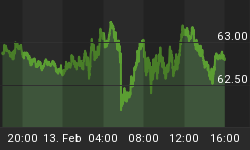The focus over the last few days has clearly been central bank follies. In just the last week:
- The Swiss National Bank (SNB) abruptly stopped trying to hold down the Swiss Franc from rising against the Euro; the currency immediately rose 20% against the continental currency (see chart, source Bloomberg). More on this below.
-
The ECB, widely expected to announce the beginnings of QE tomorrow (Jan 22nd), have quietly mooted about the notion of buying approximately €600bln per year, focused on sovereign bonds, and lasting for a minimum of one year. This is greater than most analysts had been expecting, and somewhat open-ended to boot.
-
The Bank of Canada announced today a surprise cut in interest rates, because of the decline in oil prices. Unlike the U.S., which would see an oil decline as stimulative and therefore something the central bank would be more inclined to lean against, Canada's exports are significantly more concentrated in oil so they will tend to respond more directly to disinflation caused by oil prices. This explains the very high correlation between oil prices and the Canadian Dollar (see chart below, source Bloomberg).
Back to the SNB: the 20% spike in the currency provoked an immediate 14% plunge in the Swiss Market Index, and after a few days of volatility the market there is still flirting with those spike lows. The Swiss economy will shortly be back in deflation; the SNB's addition of vast amounts of Swiss Francs to the monetary system had in recent months caused core inflation in Switzerland to reach the highest levels since 2011: 0.3% (see chart, source Bloomberg).
The good news for Europe, of course, is that the reversal will cause a small amount of inflation in the Eurozone - although probably not enough to notice, at least the sign is right.
Clearly the SNB had identified that trying to keep the Swissy weak while the ECB was about to add hundreds of billions of Euro to the system was a losing battle. In the long history of central bank FX price controls, we see failures more often than successes, especially when the exchange-rate control is trying to repress a natural trend.
But the point of my article today is not to discuss the SNB move nor the effect of it on local or global inflation. The point of my article is to highlight the fact that the sudden movement in the market has caused several currency brokers (including FXCM, Alpari Ltd., and Global Brokers NZ Ltd.) to declare insolvency and at least two hedge funds, COMAC Global Macro Fund and Everest Capital's Global Fund, to close. More to the point, I want to highlight that fact and ask: what in God's name were they doing?
Let's review. In order to lose a lot of money in this trade, you need to be short the Swiss Franc against the Euro. Let's analyze the potential risks and rewards of this trade. The good news is that the SNB is going your way, adding billions of Swissy to the market. The bad news is that if they win, it is likely to be a begrudging movement in the market - the underlying fundamentals, after all, were heavily the other direction which is why the SNB was forced to intervene - and if they lose, as they ultimately did, it is almost certainly going to be a sudden snap in the other direction since the only major seller of Swiss was exiting. Folks, this is like when a commodity market goes limit-bid, because everyone wants to buy at the market's maximum allowable move and no one wants to sell. When that market is opened for trading again, it is very likely to continue to move in that direction hard. See the chart below (source: Bloomberg) of one of my favorite examples, the early-1993 rally in Lumber futures after a very strong housing number. The market was limit-up for weeks, most of the time without trading. If you were short, you were carried out.

Of course, there was at least a rationale for being short lumber in early 1993. No one knew that there was about to be a huge housing number. There's very little rationale to being short Swiss Francs here that I can fathom. This is a classic short-options trade. If you win, you make a tiny amount. If you lose, then you blow up. If you do that with a tiny amount of money, and make lots of small bets that are not only uncorrelated but will be uncorrelated in a crisis (it is unclear how one does this), then it can be a reasonable strategy. But how this is a smart strategy in this case escapes me. And as a broker, I would not allow my margining system to take the incredibly low volatility in the Euro/Swiss cross as a sign that even lower margins are appropriate. VaR here is obviously useless because the distribution of possible returns is not even remotely normal. Again, as a broker I am short options: I might make a tiny amount from customer trading or carry on their cash positions; or I might be left holding the bag when the margin balances held by customers prove to be too little and they walk away.
And I suppose the bottom line is this: you cannot know for certain that your broker or hedge fund manager is being wise about this sort of thing. But you sure as heck need to ask.



















